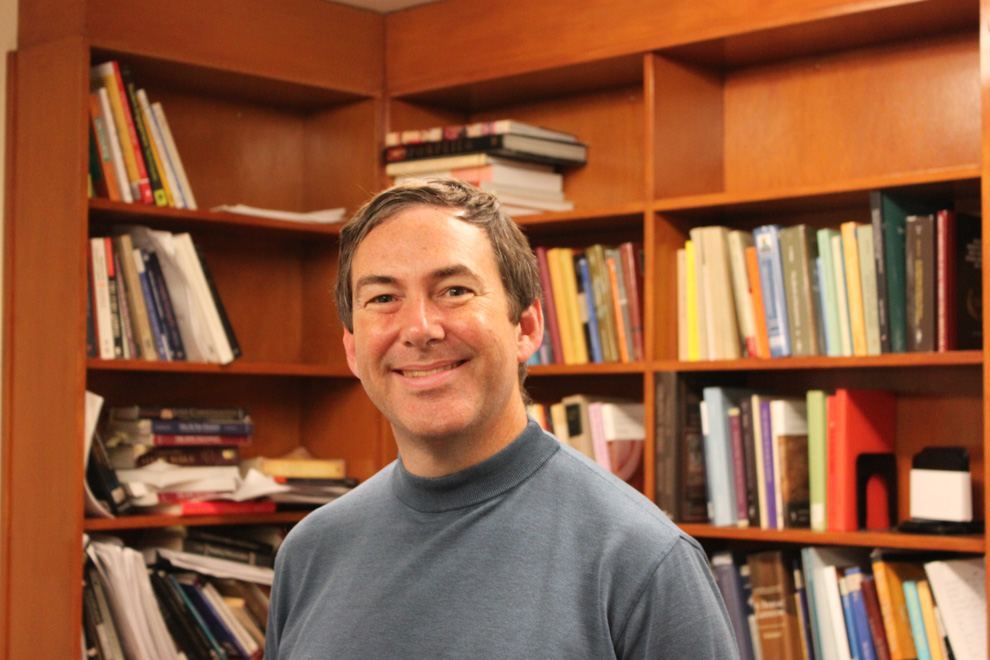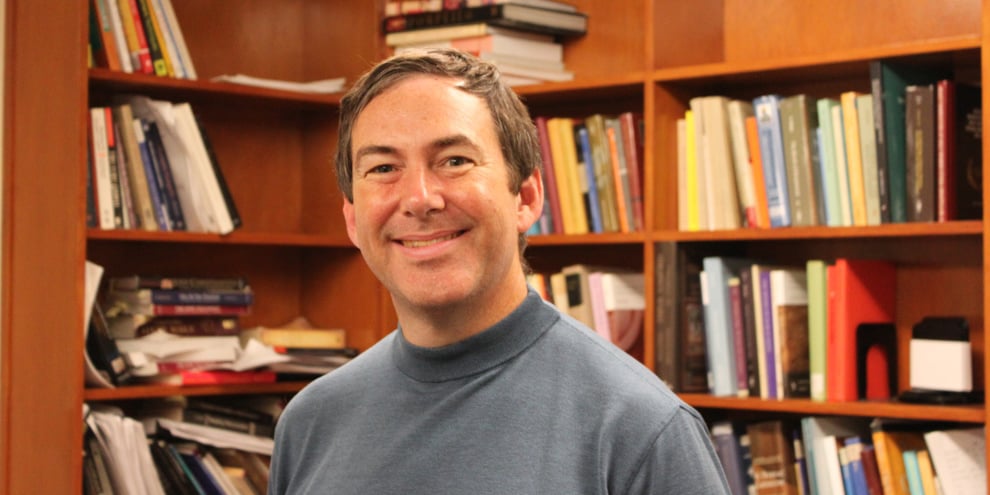Michael Penn, professor of religious studies, comes to Stanford from Mount Holyoke College. Penn, a specialist in the early history of Christianity, fell in love religious studies at Princeton after starting a degree in molecular biology. The Daily sat down with Penn to talk about his career path and interests outside of academia.

The Stanford Daily (TSD): Can you tell me a bit about your childhood and your educational background?
Michael Penn (MP): Weirdly enough, I grew up in Los Altos, right next door to here, so it’s a little bit like coming home. I did my undergrad in molecular biology at Princeton. First year, spring semester, I took this elective, “Introduction to World Religion,” and I totally fell in love with it. But here’s the problem: Since age 12, I knew that I would be a molecular biologist, and I chose to go to Princeton because it was the only place in the late ’80s that offered a degree in molecular biology. Unfortunately, it was a school that didn’t allow you to have a double major or a minor and certificate. I didn’t know what to do about the fact that I fell in love with religious studies but had this lifelong love of molecular biology. Now, even though you could only get one degree, unlike Stanford there was no limit to how many classes you took, so I went a little bonkers. I took two classes at the same time; intro physics, I could just turn in the problem sets, but upper-level Hebrew, I needed to show up at. So it was a really weird four years, and at the end of it I decided that even though I really liked molecular biology, I liked this other thing even more.
I went on to do graduate work at Duke, where I was focusing on what’s often called religions of late antiquity, or in other words, religions around the time of the Roman Empire. I started specializing particularly in Christianity, a little bit in Judaism and a little bit in Islam.
TSD: Which courses are you teaching this year?
MP: This quarter, I’m teaching a class that’s called “What Didn’t Make it in the Bible,” which is an introductory first-year seminar. It investigates the politics about how certain books made it into the Bible and how certain ones didn’t. Who made those choices when, and what were their motivations? Obviously that has a pretty big impact when there are two billion modern Christians today that hold them sacred. So, officially, it’s a class about antiquity, but probably like all my other classes, the reason I’m interested in it is the ramifications it has for today. We get to read a lot of wild and wacky things, like an early account of five-year old Jesus — who throws temper tantrums killing most of his playmates but fortunately later [resurrects] them — tours of heaven and hell, different ways the world is going to end, a bunch of so-called gnostic scriptures, ancient Christian Harlequin romance novels. It’s a total blast and it’s a wonderful group of students.
The other class I’m teaching this quarter is called “Sex in the Early Church.” It looks at early Christian views and Roman views of human sexuality and sexual ethics. It’s a very interesting class because it reminds us that the way we think about sexuality, gender and body is not the way people always did. That in some ways makes us question some of the constructs that we take for granted. So again, like other classes, most of the reading is in the ancient world. I almost think of it as a good study abroad; many of us do a study abroad to experience a different culture and then come back thinking a little differently about our own. I haven’t found a time machine yet, so I’m trying to do the next best thing.
In the spring quarter I’m only teaching one undergraduate class, and that is “Exploring the New Testament.” It’s an introductory class that looks at issues of the historical context of how we got the New Testament, what’s in it, as well as a few things that didn’t make it in. And I have a Ph.D. seminar that’s on pedagogy.
TSD: What drew you to religious studies? Why do you enjoy teaching this subject?
MP: I just fell in love with the ability to learn about radically different ways of looking at the world, to really appreciate and love traditions that I wasn’t familiar with and also to better appreciate the diversity of the traditions I was familiar with. I found that amazingly addictive, and that really kept me going.
TSD: How have you collaborated with other faculty members in the Religious Studies department? What kinds of projects are you involved in?
MP: One of the big projects we’re doing as a department is revamping our intro religion class, so we’re spending a lot of time together thinking about how to make that curriculum even stronger. We are hiring a new professor in Islamic studies, so I’m heading that search. I also do a lot of work in the intersection of computer technology and the study of religion. In particular, what I do is I work with computer scientists and data scientists who have developed different computational techniques for the analysis of modern handwriting for things like security software and apply that to ancient manuscripts. So I’m working with folks in the library and folks in what’s called CESTA, which is our Center for Spatial and Textual Analysis. At any given time, I’m also employing a dozen or so students as part of that project.
TSD: What are your interests outside of religious studies?
MP: I, like everyone here, also put a few other things on my platter. I’m very bad at it, but I practice a martial art called Aikido, so I’m starting the Stanford Aikido club. I also enjoy swing dancing, particularly Lindy Hop, so I do that over in Palo Alto. I like to cook and invite tons of friends over. I also have a not too secret pastime… I like reading trashy science fiction. I don’t think it’s trashy, but all my friends do. I also have twin daughters who are eight-year-olds, so they keep me a little bit busy. I also like playing Euro strategy games like Settlers of Catan.
TSD: What are you currently reading at work and for leisure?
MP: Right now in terms of work stuff, what’s on this week’s platter includes some articles on teaching world religion and some others on recent computational techniques for analysis of ancient handwriting. The night time reading, again, is more trashy science fiction. I particularly like science fiction written after year 2000 or so. There’s a genre called Cyberpunk that I really want to like, and I haven’t yet, which dominated the ’90s, and then everything became very into dystopia, and for some reason I like dystopia. So that’s more what’s on my Kindle.
TSD: What can students gain from taking courses in religious studies?
MP: A large number of my students are studying a tradition that may not be their own, and many, perhaps even most, define themselves as not religious. One of the misconceptions in virtually every campus in the U.S. is that a department of religious studies somehow is Sunday school or that students are expected to come with some sort of religious background. Instead, most religious studies classes are much more akin to a history class.
One of the things I love is that students have the opportunity to take religious studies classes in all these different traditions, especially as the world is increasingly global. To understand what are some of the core beliefs of people other than yourself is actually super important. Regardless of whether your concentration is politics, computer science, physics or international law, this has something that’s going to really affect you long-term. Most of our majors are double majors, which means they’re bringing a different sort of skill set and a different perspective to what we’re looking at.
This interview has been edited and transcribed.
Contact Olivia Mitchel at omitchel ‘at’ stanford.edu.
